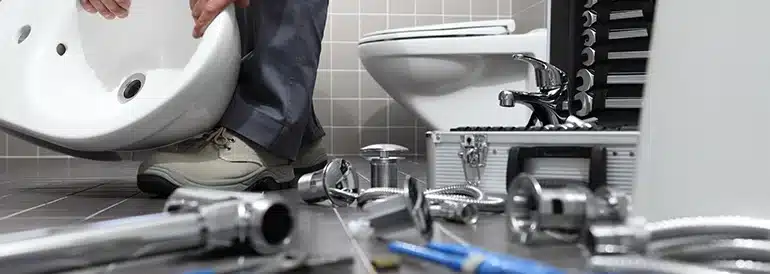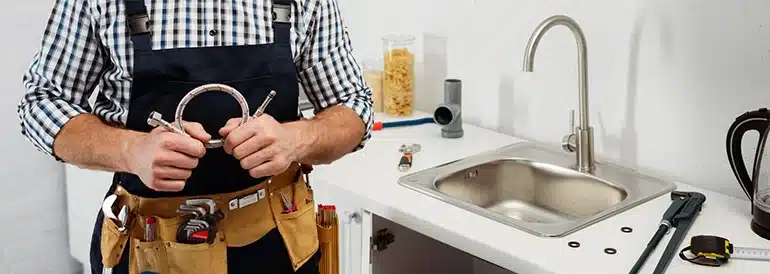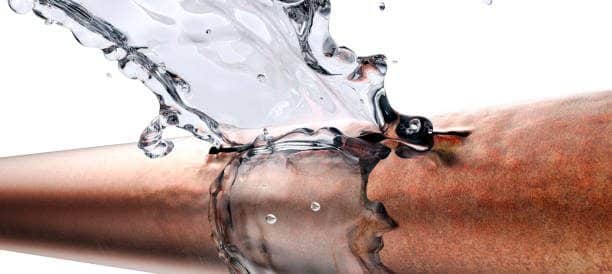Estimating plumbing materials is a crucial step for any plumbing project, whether you’re a professional plumber or a DIY enthusiast. Accurate estimates help ensure that you have everything you need to complete the job efficiently, without unnecessary delays or costs. In this blog post, we will guide you through the process of estimating plumbing materials effectively.
Call (773) 968-2704 to book a sewer inspection now. Count on J Sewer & Drain Plumbing Inc. in Chicago, IL, for all your plumbing needs.
Understanding Your Project Scope
Before diving into the specifics of material estimation, it’s essential to understand the scope of your plumbing project. Are you installing new fixtures, repairing existing pipes, or perhaps renovating an entire bathroom? Each project has different requirements and will necessitate various materials.
Assessing Your Needs
- Identify the Type of Work: Determine whether you are doing new installations, repairs, or replacements.
- Create a List of Fixtures: Make a list of all fixtures involved in your project—sinks, toilets, bathtubs, faucets, etc.
- Consider Local Building Codes: Familiarize yourself with local plumbing codes and regulations that may affect your material choices.

Common Plumbing Materials
To estimate your plumbing materials accurately, it’s essential to know the common types used in various projects:
Pipes and Fittings
- PVC (Polyvinyl Chloride): Commonly used for drain lines and vent systems.
- CPVC (Chlorinated Polyvinyl Chloride): Suitable for hot water applications.
- PEX (Cross-linked Polyethylene): Flexible and easy to install; great for residential plumbing.
- Copper: Durable and often used for supply lines but can be more expensive.
Fixtures
- Sinks: Available in various materials like stainless steel, porcelain, and composite.
- Toilets: Consider water efficiency ratings when selecting models.
- Faucets: Choose based on style and functionality; remember to check compatibility with existing sinks.
Valves and Connectors
Valves control water flow in your system. Ensure you have shut-off valves for every fixture. Connectors such as couplings and elbows are also necessary for joining pipes together.
Estimating Quantities
Once you’ve identified the materials needed for your project, it’s time to estimate quantities:
Measure Your Space
Accurate measurements are vital when estimating how much material you’ll need:
- Length of Pipes: Measure the distances between fixtures where pipes will run.
- Number of Fixtures: Count each fixture that requires connection to water supply lines or drainage systems.
Use Standard Sizing Guidelines
Most plumbing materials come in standard sizes:
- Pipes typically come in 10-foot lengths; consider how many lengths you’ll need based on your measurements.
- For fittings like elbows or tees, estimate one fitting per change in direction or junction point.

Calculating Costs
After estimating quantities of each material type needed for your plumbing services project, it’s time to calculate costs:
- Research Prices: Check local hardware stores or online retailers for current prices on each item.
- Add Extra Material: It’s wise to add about 10% extra material as a buffer against mistakes or unexpected issues during installation.
- Total Cost Calculation: Multiply the quantity by the price per unit for each item and sum them up to get an overall cost estimate.
Seeking Professional Help
If you’re unsure about any aspect of estimating plumbing materials—or if your project is extensive—it may be beneficial to consult professional plumbing services. Experienced plumbers can provide insights into what materials are best suited for specific applications and help avoid costly mistakes.
Benefits of Professional Consultation
- Expertise: Professionals have extensive knowledge about local codes and best practices.
- Time-Saving: They can quickly assess what is needed without trial-and-error methods that may delay projects.
- Quality Assurance: Using professional services ensures high-quality work that meets industry standards.
Final Thoughts
Estimating plumbing materials accurately is essential for ensuring a successful project outcome—whether you’re handling it yourself or working with professional plumbing services. By understanding your project’s scope, familiarizing yourself with common materials, measuring accurately, calculating costs effectively, and knowing when to seek help from professionals, you can streamline the process significantly.
Remember that proper planning not only saves time but also helps manage budgets effectively while ensuring quality results in all aspects of plumbing work! Whether you’re embarking on a small repair job or a large renovation project involving multiple fixtures and complex piping systems—taking these steps will set you up for success!
Call (773) 968-2704 to book a sewer inspection now. Count on J Sewer & Drain Plumbing Inc. in Chicago, IL, for all your plumbing needs.






